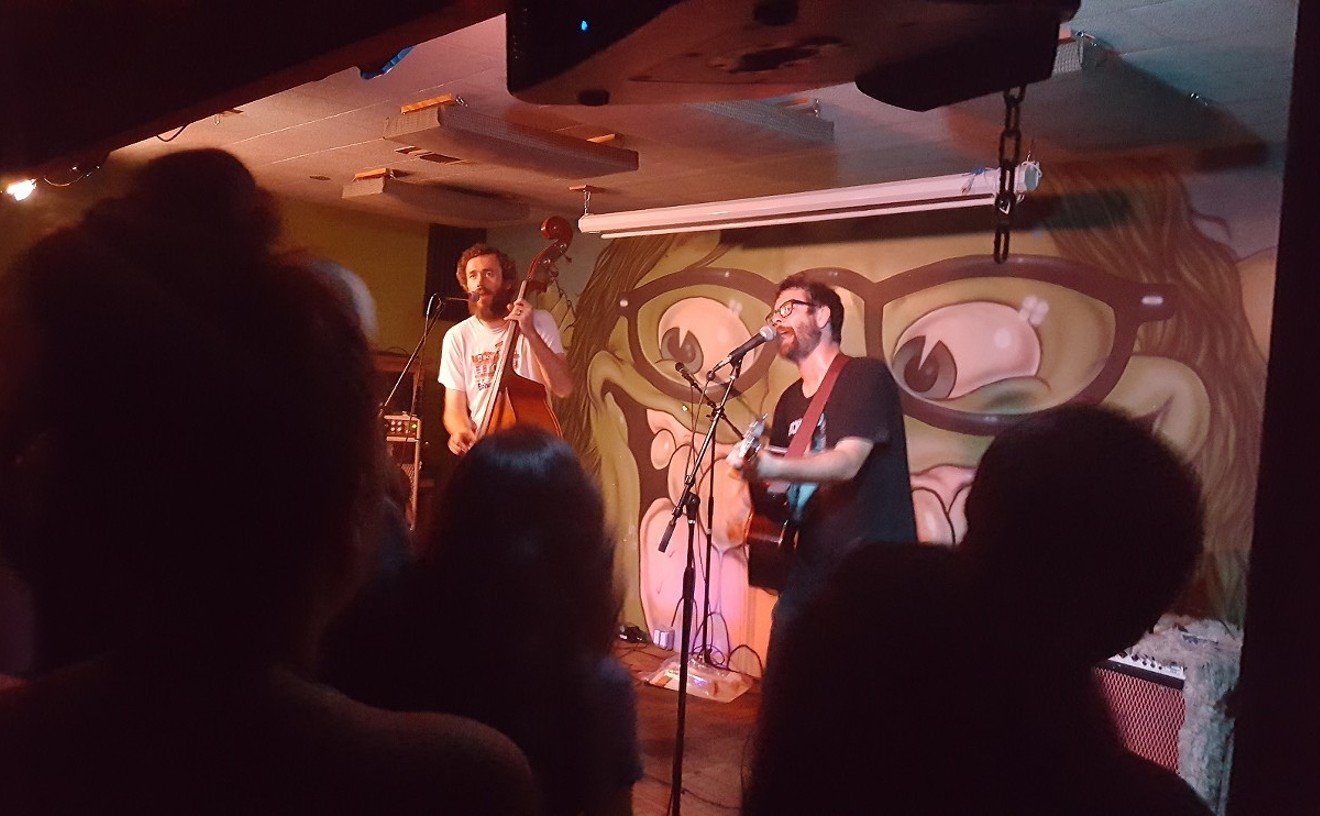New Times: You claim that laughing can cure mental illness. You must be joking.
Markham Breen: Well, where mental illness is concerned, we don't have many cures. But like psychotherapy or medication, laughter can help. Some pretty good studies have shown that it helps decrease anxiety. And we know that laughter is good for depression, because how can you be depressed and laughing at the same time? And there's a physiology to laughter that, much like yoga or rigorous exercise, is really beneficial, particularly to those with anxiety.
NT: I thought incessant laughing was a symptom of mental illness.
Breen: Yes, but we don't use laughter therapy with individuals who are losing their grasp of reality--people with extreme disorders like schizophrenia or bipolar people during a manic episode. That wouldn't really be a great time to use laughter therapy. But when those folks are stable or on medication, they've really enjoyed it. I've done this with a lot of young people with very serious diagnoses, a lot of bipolar kids, but it's not for everyone at all times.
NT: What is laughter therapy?
Breen: It's a movement. There's an institute right here in Phoenix, the Association for Applied Therapeutic Humor, that's looking into the research end of how laughter can best be used.
NT: Wait. We have a laughter institute here?
Breen: Yes. They promote the use of laughter in the therapeutic arts. Did you see the movie Patch Adams? It starred Robin Williams. He played a doctor who puts on a clown suit and interacts with the patients and uses a lot of humor in the treatment process.
NT: God, no! You mean there's a place here in Phoenix where the doctors are all dressed as clowns?
Breen: No, they're not dressed up. It's more of a research center.
NT: What is that book you have there?
Breen: It's called Laugh for No Reason by Dr. Kataria, a doctor in India. He sort of created a form of yoga that uses laughter without jokes. He writes that you don't have to laugh 24 hours a day, but if you laugh 20 minutes twice a week, it can be very good for you.
NT: This book is full of pictures of people wearing funny hats.
Breen: Yes. Dr. Kataria tried to get people together to laugh, but he found that telling jokes didn't work because you either run out of jokes, or the jokes begin to insult certain groups of people. So he created a yogic way of doing breathing and laughing without jokes, but he had to come up with different ways to make groups of people laugh. Funny hats is one way. It's ridiculous, because you're looking at each other and then you spontaneously laugh. There are groups in India that get together, upwards of 300 people, and just laugh and laugh as a mental exercise. And just as yoga has a series of different poses, this laughter therapy has a series of different laughs. There's the lion laugh, the Swedish cocktail laugh, and then...
NT: Wait. Stop. The Swedish cocktail laugh?
Breen: Yes, it's quite an elegant laugh. We're told that in Sweden they have these cocktail parties that are very superficial. You walk around with your pinkie finger up in the air, and you greet each other by touching your pinkies together and you laugh like this: Heeeeee hee-hee-hee!
NT: That's ridiculous.
Breen: Exactly. When you walk around a room with other people doing this, eventually you're going to crack up because it's absurd. And the lion laugh, well, I hate to do this one so early in the morning, but here goes: Haaaaa haa-ha-ha!! Ha ha!
NT: Is it really necessary to wave your hands and wag your tongue when you do that?
Breen: Yes, you need the whole combined effect, and you want to look as ridiculous as possible. That one works great with troubled adolescents. I've worked with a lot of gangs, and there is no more uptight group than gang-involved adolescents. They're just too cool for words. You take them through this process and you get a whole different kid when you're done.
NT: You can actually get one of the Crips to giggle?
Breen: You know, the hardcore gang members don't want to get involved, they just want to stand around and look menacing. But once you let them make up their own laughs, these kids really loosen up. Laughter groups are very effective, and they're just one little sliver of the therapeutic humor movement.
NT: It's a movement?
Breen: It is! Four years ago, I took this training with this guy who went to India and learned this method from Dr. Kataria, and brought it to the United States through this thing called the World Laughter Tour. He offered trainings, and I became a certified Laughter Leader. Now, I don't take that certification very seriously--
NT: Well, how could you? What--and I'm sure I'm going to be sorry I asked--is a laughter leader?
Breen: Someone who can teach and facilitate laughing without jokes. So that people can get together once or twice a week and gain the physiological benefits of laughter without having to have new material--new jokes to tell.
NT: What are the tools of your trade? Rubber chickens? Whoopee cushions?
Breen: No. You can get some of those things to sort of lighten the mood, but you don't have to have them. You bring your own personality, and the laughter, the humor comes from that.
NT: But just because I can fake a laugh doesn't mean I'm happier.
Breen: That's correct. But fake laughter still gives the physiological benefits of laughter.
NT: So if I just sit here, laughing, my spleen will stop hurting?
Breen: Well, I'm not going to claim that laughter therapy will heal spleens. But it is great for your body, for relieving stress. Do it for 15 or 20 minutes, and you'll definitely benefit.
NT: What's the Laughter Club? I read where members "participate in a routine of chuckles and chortles." This sounds slightly terrifying.
Breen: But it isn't. The Laughter Club is a group of people who get together and do this laughing process with some regularity. Anyone can join. I wish I could point you to a Laughter Club that is up and running in the valley, but there isn't one right now. I'm trying to convince the Scottsdale YMCA to do one, but I haven't had any luck so far.
NT: You mentioned before something called The World Laughter Tour. Is that like Pearl Jam, only with psychotherapists who make funny faces and farting noises?
Breen: Not exactly, no. It's mostly a psychologist out of Ohio named Steve Wilson training people how to use laughter therapy. Clowns have taken this training; social workers--you don't have to be a mental health worker. Different people do it for different reasons. The students are actually taught different laughs. It's like learning deep breathing exercises in yoga.
NT: I guess the cool thing is you can do laughter therapy at work, on your coffee break. Although I wouldn't want to be caught at the water cooler, snickering to myself.
Breen: It really helps to have peer support. But there are companies that actually do this in the morning before the shift begins. The City of Phoenix had an employee recognition event, and they had me in and we did an hour of laughter therapy.
NT: City employees, laughing? I'd like to have seen that.
Breen: Exactly! Who needs it more?
NT: Stop, you're killing me! So I guess where laughter therapy is concerned, you're laughing all the way to the bank.
Breen: You know, I'm really just getting started, and I haven't seen a lot of money, to be honest. But I can definitely train someone to be a laughter leader; it's not rocket science. It's really useful in our workplaces, our senior centers. In terms of quality of life, a little laughter is good for everyone.
E-mail [email protected]










